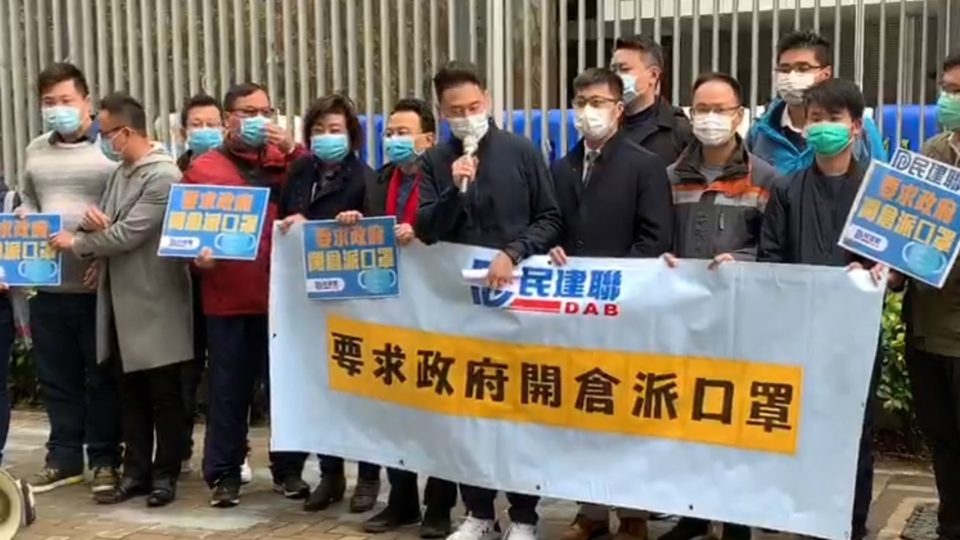With mask fever continuing to sweep Hong Kong amid swirling fears over the Wuhan coronavirus, Chief Executive Carrie Lam drew fire today from her own pro-Beijing allies for forgoing a face mask at her weekly presser, a deliberate step she said had been extended to all government officers in an effort to conserve mask supplies.
Given what even officials have acknowledged is a shortage of masks in the city, Lam said that she and other government employees should adhere to WHO guidelines that only high-risk groups, such as the elderly, those who are sick, and those entering crowded places need to wear face masks.
“If they don’t match those criteria, they are not allowed to wear masks,” Lam said, according to RTHK.
The Financial Services Department issued a similar directive to government offices, noting that while civil servants aren’t forbidden from wearing their own masks, they should limit the distribution of government ones.
It wasn’t long, however, until the seemingly magnanimous gesture had simply fed back into the ongoing uproar over masks, sparking criticism from the DAB, the city’s largest pro-establishment party.
DAB lawmaker Holden Chow said Lam’s remarks would only exacerbate the panic surrounding the shortage.
The party also issued a petition making the not-at-all-panic-inducing suggestion that the government distribute what they claimed were millions of masks being stockpiled in government warehouses, then seize control of the supply of face masks on the open market by declaring them a restricted commodity.
Whether masks do in fact protect everyday people from contracting the Wuhan coronavirus is actually up for debate. Little definitive research has been done on the matter outside of hospital settings, and experts note that simply washing one’s hands frequently and avoiding sick people is just as effective, the New York Times reports.
While masks can block the droplets of fluid from coughs and sneezes that carry coronavirus, they are often rendered less effective by user error. They also do nothing to protect wearers from touching potentially contaminated objects and, for instance, rubbing their eyes without washing their hands.
Nonetheless, mask fever in Hong Kong has become so all-consuming that it has also crept into one corner of the city typically reserved for fun: arcades featuring claw machines that dispense prizes to players.
A Facebook forum has pointed out that claw machines in a Tin Shui Wai mall were giving punters a chance to snag boxes of face masks at just HK$5 apiece — a steal given the price hikes that have come with the ongoing shortage. Meanwhile, other machines with a “prize-winning guarantee” (which means players will ultimately get a box of masks even if they’re less than adept at manipulating the claw) were hawking boxes of masks at HK$300 a pop.
https://www.facebook.com/hklaughpic/posts/2815796378486952?__xts__[0]=68.ARCxHFP9GZ1nSwpN-FT2thWFuOyLgQWXjhHjqmEMS2Y-ASvFRdH5fLekAdDLaaKqFvvDlIIQ-dBGzktZFbZY4i3PRnTLgJNWx2SmYAR0TcwAV3GZwVGw044K0PNeNBDYpl6CHVW-odoVG-nXpf6gNYHjCxDAKD4W0WfOSpuqGgmN2KzDZM4WUXYxDJSlevYYhTsWkVtJZJ3i2HzTvLIID3OIN17IFBad1yslfGqslZT-ml9CEWNptDvn8EGFaFZJQRPwlg_MdZG3zZKZOLSGooKI9cWSvphPbmJezCSkVAvF9FshNstOa6U__QaKR3idRBQDLvvHaGAs2JhMI6javHmF7aBA&__tn__=-R
Responses to the post were overwhelmingly negative.
“Unscrupulous assholes who take advantage of the public’s need of masks,” one netizen said.
“Whoever did so has no humanity,” added another.
Another drily suggested that masks procured from a claw machine might not exactly be medical grade.
Meanwhile, users of the Reddit-like forum LIHKG pointed out similar machines in other districts, including Sham Shui Po and Lam Tin.
It should come as little surprise that the trend has also spread to Taiwan, a country that not only has a unique claw machine craze, but is also highly concerned over the Wuhan virus, Taiwan News reports.
Chen Yi-ting, head of the Taipei Department of Health, warned that certain types of hand sanitizers also being advertised in claw games may technically be classified as medical equipment, and that claw game operators offering such products could be subject to fines under the Pharmaceutical Affairs Act.




